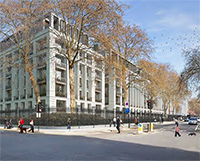
A company owned by the Qatar government has triumphed in an appeal against a £38m stamp duty land tax bill following the firm’s purchase of the former Chelsea Barracks. The decision will leave Her Majesty’s Revenue and Customs out of pocket on the near £1bn purchase in 2008.
Project Blue Ltd, controlled by Qatar’s sovereign wealth fund, bought the site in Chelsea Bridge Road from the Ministry of Defence in January 2008 for £959m. However, Court of Appeal judge Lord Justice Patten said today that the tax consequences of the transaction were “complicated by the fact that it decided to obtain finance for the acquisition and development of the site in a way that was compliant with shari’a law”.
A conventional loan at interest secured by a charge over the site would not be shari’a-compliant, therefore Project Blue contracted to sell the site to Masraf al Rayan (“MAR”), a Qatari bank, for the US$ equivalent of about £1.25bn (calculated to comprise the purchase price plus substantial additional amounts to cover SDLT and future development costs).
Both contracts completed contemporaneously on 31 January 2008, and MAR granted to Project Blue a lease of the site for a term of 999 years.
The Upper Tribunal found in December 2014 that SDLT was payable by Project Blue in the sum of £38.36m based on a consideration of £959m.
But PBL took its case to the Court of Appeal, claiming it had no liability for any SDLT on the transaction.
It argued that MAR was the correct party liable for the tax, but that HMRC is now out of time for making any determination or assessment in order to recover it.
HMRC also appealed, claiming that the true taxable sum was the £1.25bn paid by MAR, which would result in an SDLT liability of £50m.
However, today the Court of Appeal found in favour of Project Blue. Lord Justice Patten said that MAR was the “real purchaser of the freehold and, for tax purposes, has to be treated as such”.
Commenting on the decision, Alex Barnes of Irwin Mitchell said: “This result could, subject to any further appeal, lead to a loss of further revenue if other taxpayers challenge HMRC over similar matters. This is not good news for the Treasury and its edict to collect as much tax as possible from property transactions.
“It remains to be seen whether HMRC will appeal this decision. I suspect it will.”









